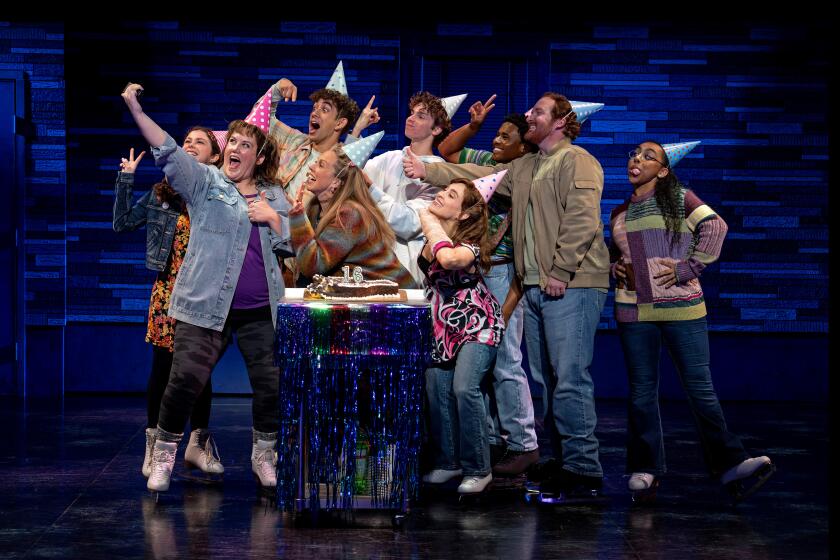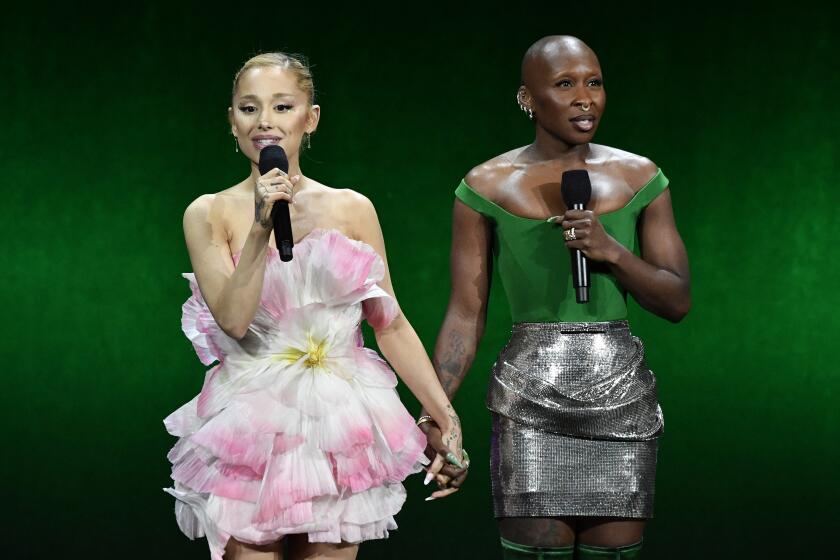‘Gun-Shy’ Hits Most of Its Comic Targets
The dialogue in Richard Dresser’s “Gun-Shy” crackles like gunfire in a shooting gallery. Funny, juicy lines pop off at regular intervals. They’re not fired at random; they add up to a mordant examination of contemporary men and women who are “gun-shy,” or otherwise conflicted about the romantic relationships they sometimes crave.
A New York critic called Dresser’s play “a ‘Private Lives’ of our time”--a tribute that’s reproduced on the cover of the published script--and the comparison is apt on several levels. Both Dresser’s play and Noel Coward’s classic feature divorced mates who apparently have found new loves. Both playwrights united all four of the would-be lovers for concentrated squabbling in the last act.
For the record:
12:00 a.m. June 1, 2000 For the Record
Los Angeles Times Thursday June 1, 2000 Orange County Edition Metro Part B Page 3 Metro Desk 1 inches; 18 words Type of Material: Correction
Actor--In a caption accompanying a review Saturday of Laguna Playhouse’s “Gun-Shy,” actor Paul O’Brien was misidentified.
But Dresser’s comedy is clearly contemporary. Structurally, this means that it’s broken up into two acts of 11 scenes each, which presumably suits modern attention spans better than the fewer, longer passages of dialogue in Coward’s play. Unfortunately, this also puts an occasional damper on the comic momentum. At least in Richard Stein’s staging at Laguna Playhouse, the laughter never quite takes off into the uncontrollable realm, like it can in a good production of “Private Lives.”
The choppiness of the text also undercuts the author’s intention, described in a recent Times interview, of digging beneath the banter for something more serious, more affecting. We can appreciate that the characters are often trapped in pain--indeed, in the first lines, one of the couples discusses the meaning of pain. But we don’t quite feel their pain.
Nonetheless, as a satirical cartoon, the script is a marvel, hitting its targets more often than not. Gun imagery that’s strewn throughout the play adds another layer of light satire. One character, who works for handgun control, met her new lover when he arrived to turn in his handgun; one of the men is concerned that his semen “shoots blanks”; occasional actual gunshots are heard. Americans appear to have a love-hate relationship with guns that is almost as intense as their love-hate relationships with each other.
The couple whose divorce started the ball rolling consists of Evie (Tracy Lore) and Duncan (Paul O’Brien). They’re parents of an unseen 13-year-old boy, who’s in trouble at a New England prep school. He’s the ostensible tie that keeps them active in each other’s lives.
While visiting her sister in the Northwest just before the play opens, Evie latched onto Carter (Robert Lee Jacobs), a mastermind at coffee marketing. Evie is the aggressor here, while Carter hangs back from total reciprocation--which, in Evie’s mind, would mean making their own baby, with no mention of marriage.
Back in New England, Duncan and Caitlin (Stacy Solodkin) are the ones who were brought together by the gun-control issue. Here it’s the man who wants more from the relationship than the considerably younger woman. In fact, she wants their romance to stay on the tentative level of the sneaking-around, pre-divorce days.
Three of the four are wildly neurotic. Evie is about as emotionally controlling as Genghis Khan, and Lore delivers Evie’s “psychic drive-bys”--Carter’s description of her emotional assaults--with barbed stylishness, never going too far over the top.
Carter is rabidly competitive, which reflects not only a rampant nervousness about his masculinity but also, we learn late in the play, a deep-seated insecurity derived from his family history during his teen years. The play doesn’t pause to dwell on this history, however, and neither does Jacobs, whose performance is the showiest and funniest.
Caitlin’s own insecurity is reflected in her near-anorexic diet as well as her hesitancy with Duncan, and Solodkin keeps Caitlin edgy and lightheaded, befitting someone who isn’t getting enough sustenance. Duncan, on the other hand, is relatively level-headed, and O’Brien lends a regular-guy solidity to the proceedings that helps prevent the play from flying off its hinges. JD Roberto provides expert support in five small roles.
Although a quick tempo is essential, in part to cover up the many gaps between scenes, a few of the lines on opening night were rushed so much--or perhaps so obscured by the laughter from the preceding lines--that they didn’t fully register. A slightly slower pacing within scenes might help establish a little more empathy for these brilliantly troubled characters.
* “Gun-Shy,” Laguna Playhouse, Moulton Theatre, 606 Laguna Canyon Road, Laguna Beach. Tuesdays-Saturdays, 8 p.m.; Sundays, 7 p.m.; Saturdays-Sundays, 2 p.m. Dark Sunday evenings June 18 and 25. Ends June 25. $21-$40. (949) 497-2787. Running time: 2 hours.
Tracy Lore: Evie
Robert Lee Jacobs: Carter
Paul O’Brien: Duncan
Stacy Solodkin: Caitlin
JD Roberto: Waiter, Ramon, Neil,
Nurse, Paramedic
Written by Richard Dresser. Directed by Richard Stein. Sets by Don Gruber. Costumes by Michael Pacciorini. Lighting by Paulie Jenkins. Sound by David Edwards. Stage manager Nancy Staiger.
More to Read
The biggest entertainment stories
Get our big stories about Hollywood, film, television, music, arts, culture and more right in your inbox as soon as they publish.
You may occasionally receive promotional content from the Los Angeles Times.










